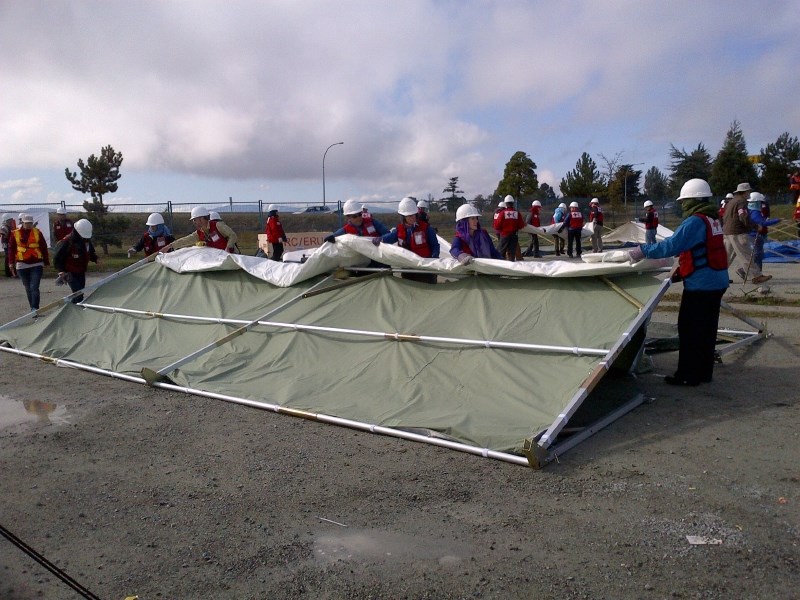A mock mobile-field hospital, the size of a football field, is operating in Sidney this week to train delegates from around the world how to respond to large-scale disasters, including a catastrophic earthquake in B.C.
Forty delegates — 10 international participants and 30 from Canada, including three from Vancouver Island — have set up about 10 tents at the Mary Winspear Community Centre until Thursday. They slept on site for the first time Monday night and this morning.
“They are trained to set up a hospital and begin surgery within 12 hours or less,” said Hossam Elsharkawi, director of emergencies and recovery for the Canadian Red Cross. “There is no time to waste after disaster hits.”
Twenty-five international, domestic and provincial trainers are on hand. The Red Cross emergency response unit features a standard package of trained personnel and equipment ready for deployment within one to two days after a disaster strikes.
The Canadian Red Cross is holding the training here at the request of the B.C. government, Elsharkawi said. It’s usually held near Pearson International Airport in Toronto.
The B.C. government and the Red Cross inked a partnership deal in 2012 — the first of its kind in Canada, according to the Red Cross — to help ensure immediate deployment of national or international emergency response units to assist B.C. in the event of a major earthquake.
Representatives from Emergency Management B.C., Island Health and its mobile medical unit, the Ministry of Health and Victoria Emergency Management Agency and public health units are observing the exercises.
B.C. Health Minister Terry Lake and Attorney General Suzanne Anton agreed that this is the preparation and collaboration needed to effectively respond and support British Columbians in the case of a natural disaster.
The training will give some provincial emergency responders unparalleled hands-on experience and a unique overview of how the mobile unit works in a disaster, Elsharkawi said.
The disaster-response professionals come from around the world and across Canada, and are chosen based on a variety of skills and experiences and professions. They include doctors, nurses, technicians, accountants, communication specialists, electricians and sanitation personnel who volunteer their time during training and are paid during their service in disaster zones.
All have completed classroom training in fundamental principles of humanity, impartiality, neutrality, independence, voluntary service, unity and universality, Elsharkawi said.
Participants are trained to set up shop in the midst of war, conflict or in the rubble left behind in the aftermath of an earthquake.
When summoned, the Canadian Red Cross emergency response unit mobile field hospital — perpetually on standby when not deployed — is typically set up beside a fully functioning, partially functioning or demolished hospital in a disaster, he said.
Training occurs year-round as participants and local authorities are educated to think and plan for the unthinkable, Elsharkawi said.
Imagine, for example, that an earthquake had left Victoria General Hospital in rubble while Royal Jubilee Hospital was left standing. In such a case, the unit likely would set up beside VGH, Elsharkawi said.
Once deployed, an emergency response unit mobile field hospital is expected to be self-sufficient for up to one month and can be deployed up to four months. Professional workers usually rotate in and out after four weeks of duty.
Most recently, the unit aided a hospital that was damaged in the city of Ormoc in the Philippines by typhoon Haiyan, which killed thousands and devastated portions of Southeast Asia last November.
The Canadian Red Cross, a non-profit and humanitarian organization focused on disasters and emergencies along with community health and wellness programming, currently has a project in Sierra Leone to help deal with the Ebola crisis.
• For more on emergency preparedness, visit
emergencyinfobc.gov.bc.ca/ or getprepared.gc.ca.
• For more on Red Cross programs, visit redcross.ca. To learn how to become an emergency- response unit delegate, visit redcross.ca/eru or redcross.ca/careers.



